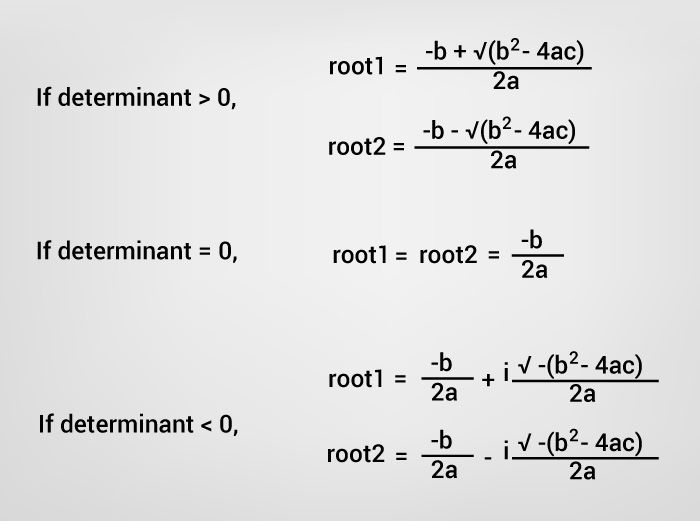
jhyatt1017
7/18/2018 - 3:40 AM
Find All Roots of a Quadratic Equation
#include <iostream>
#include <cmath>
int main()
{
float a, b, c, x1, x2, discriminant, realPart, imaginaryPart;
std::cout << "Enter coefficients a, b and c: ";
std::cin >> a >> b >> c;
discriminant = b * b - 4 * a * c;
if (discriminant > 0) {
x1 = (-b + sqrt(discriminant)) / (2 * a);
x2 = (-b - sqrt(discriminant)) / (2 * a);
std::cout << "Roots are real and different." << std::endl;
std::cout << "x1 = " << x1 << std::endl;
std::cout << "x2 = " << x2 << std::endl;
}
else if (discriminant == 0)
{
std::cout << "Roots are real and same." << std::endl;
x1 = (-b + sqrt(discriminant)) / (2 * a);
std::cout << "x1 = x2 =" << x1 << std::endl;
}
else
{
realPart = -b / (2 * a);
imaginaryPart =sqrt(-discriminant) / (2 * a);
std::cout << "Roots are complex and different." << std::endl;
std::cout << "x1 = " << realPart << "+" << imaginaryPart << "i" << std::endl;
std::cout << "x2 = " << realPart << "-" << imaginaryPart << "i" << std::endl;
}
return 0;
}This program accepts coefficients of a quadratic equation from the user and displays the roots (both real and complex roots depending upon the discriminant).
For a quadratic equation ax2 + bx +c = 0 (where a, b and c are coefficients), it's roots is given by following the formula.

The term b2 - 4ac is known as the discriminant of a quadratic equation. The discriminant tells the nature of the roots.
- If discriminant is greater than 0, the roots are real and different.
- If discriminant is equal to 0, the roots are real and equal.
- If discriminant is less than 0, the roots are complex and different.
